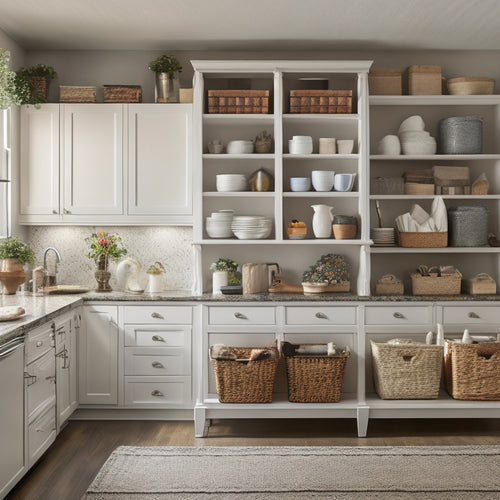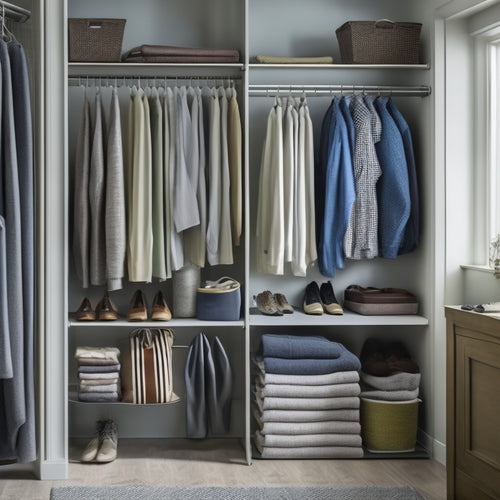
Why Clutter Accumulates in Small Home Libraries and Offices
Share
You'll likely find that clutter tends to accumulate in your small home library or office due to a combination of factors. Clutter hotspots, like hidden corners, are easily overlooked and become overflow zones. Inadequate storage and shelving lead to piling books and papers. Paper clutter and digital hoarding overwhelm your workspace, while emotional attachment to items with sentimental value makes it hard to part with them. Busy lives and procrastination habits mean little time is left for organizing. By identifying these factors, you can start to tackle the root causes of clutter and discover a more organized, productive you.
Key Takeaways
• Clutter hotspots in small spaces, like behind desks or beneath shelves, accumulate items and are easily overlooked during cleaning.
• Inadequate storage and shelving lead to clutter accumulation, making essential items difficult to store properly.
• Paper clutter and digital hoarding, including unread emails and unorganized files, can overwhelm workspaces and require effective management systems.
• Emotional attachment to items with sentimental value contributes to clutter, making it essential to find a balance between preserving memories and decluttering.
• Busy lives and procrastination habits can lead to clutter accumulation, emphasizing the need to prioritize tasks and dedicate time to organizing and maintaining workspaces.
Clutter Hotspots in Small Spaces
Your small home library or office likely has clutter hotspots where papers, books, and office supplies tend to accumulate, making it difficult to stay organized and focused.
These clutter hotspots often emerge in hidden corners, such as the space behind your desk or the area beneath your bookshelves. These areas are prone to clutter because they're easily overlooked during cleaning and organization efforts. As a result, they can quickly become overflow zones, where items pile up and create a sense of chaos.
To combat these clutter hotspots, it's essential to identify and address them regularly. Start by clearing out any unnecessary items from these areas and implementing systems to keep them organized. For example, you could install shelves or baskets to keep office supplies or books tidy.
Lack of Storage and Shelving
Inadequate storage and shelving solutions can quickly lead to clutter accumulation in small home libraries and offices, as essential items like books, papers, and office supplies have nowhere to be properly stored. You may find yourself piling books on the floor or letting papers overflow from your desk drawers.
This clutter can be overwhelming and make it difficult to focus on your work or relaxation.
To combat this, consider investing in creative storage solutions. Decorative crates can add a touch of style to your space while providing a place to store items like office supplies or out-of-season decorations. Hidden compartments, such as ottomans with storage or hollowed-out books with secret compartments, can also help keep clutter at bay.
Paper Clutter and Digital Hoarding
Piles of paper documents, receipts, and notes can quickly spiral out of control, overwhelming your workspace and making it difficult to find what you need when you need it. This paper clutter can lead to information overload, making it challenging to focus and be productive. Moreover, the rise of digital technology has also led to a new form of clutter: digital hoarding.
You may be guilty of digital hoarding if you:
- Have thousands of unread emails in your inbox.
- Store countless documents and files on your computer or cloud storage.
- Take hundreds of photos on your phone without organizing or deleting them.
- Subscribe to numerous online services and newsletters that you no longer use.
Digital hoarding can lead to a digital legacy that's just as overwhelming as physical clutter. It's essential to establish habits to manage your paper and digital clutter, such as setting up a filing system, regularly cleaning out your email inbox, and organizing your digital files.
Sentimental Value and Emotional Attachment
Many of us struggle to part with items holding sentimental value, whether it's a childhood memento, a gift from a loved one, or a keepsake from a memorable event. You might feel an emotional attachment to these items, making it difficult to let them go. This emotional connection can lead to clutter accumulation in your small home library or office.
| Emotional Attachment | Clutter Accumulation |
|---|---|
| Heirloom guilt | Family heirlooms, antique furniture |
| Memory triggers | Photos, mementos from special events |
| Fear of loss | Irreplaceable items, unique gifts |
| Nostalgia | Childhood toys, retro items |
| Sense of identity | Personal achievements, awards |
You might ask yourself, "What if I need it someday?" or "What if I forget the memory associated with it?" However, holding onto these items can lead to cluttered spaces and a sense of overwhelm. It's essential to find a balance between keeping sentimental items and maintaining a clutter-free environment. By acknowledging your emotional attachment and finding ways to preserve the memories without the physical clutter, you can create a more organized and peaceful space that still honors your sentimental values.
Busy Lives and Procrastination Habits
You're constantly juggling multiple tasks and responsibilities, leaving little time for organizing and maintaining your small home library or office, which can lead to clutter accumulation. As a result, clutter builds up, and your workspace becomes disorganized and overwhelming. This is especially true when you're dealing with a never-ending to-do list, and tasks keep piling up.
Procrastination habits can also contribute to clutter accumulation. Putting off tasks, such as filing or organizing, can lead to a massive backlog of work, making it even more challenging to get organized.
To break this cycle, it's essential to:
-
Prioritize tasks: Identify the most critical tasks that need attention and tackle them first.
-
Set aside dedicated time: Allocate specific timeslot for organizing and maintaining your workspace.
-
Use time-management tools: Utilize calendars, to-do lists, or apps to stay on top of tasks and deadlines.
- Create a maintenance routine: Establish a regular routine to maintain your organized space, ensuring clutter doesn't accumulate again.
Frequently Asked Questions
How Do I Maintain a Clutter-Free Space With a Growing Family?
You're probably thinking, "A clutter-free space? Ha! With a growing family, that's a myth!" But, you can create a clutter-free zone by establishing Family Habits, like regular tidying, and investing in clever Storage Solutions that adapt to your family's needs.
Can a Minimalist Aesthetic Work in a Small, Shared Office Space?
You can create a minimalist aesthetic in a small, shared office space by incorporating flexible furniture, like modular desks and shelving units, that adapt to different work styles, and utilizing shared desks to promote collaboration and maximize space.
Are There Any Benefits to Having Some Level of Clutter in a Creative Workspace?
You'll be surprised to know that 67% of creative professionals believe clutter boosts creativity. Embracing a level of clutter in your workspace can foster creative freedom, as the inspirational mess sparks new ideas and problem-solving approaches.
How Can I Involve My Family Members in the Decluttering Process?
You involve family members in decluttering by holding regular Family Meetings to discuss Shared Goals, assigning tasks, and encouraging open communication, making the process a collaborative effort that benefits everyone.
What Are Some Eco-Friendly Ways to Dispose of Old Papers and Documents?
You can dispose of old papers and documents eco-friendly by recycling them through local paper recycling programs or digitizing important documents through digital archiving, reducing waste and freeing up space.
Related Posts
-

3 Essential Tips to Boost Home Storage Capacity
You're one step away from freeing yourself from clutter chaos! To boost your home storage capacity, start by purging ...
-

Why Double Rods Are Key to Small Closet Organization
By installing double rods, you can instantly double your storage capacity and open up a more organized, clutter-free ...

